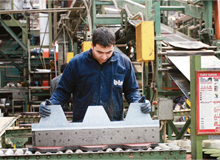 |
Industrial output in Turkey grew at its lowest level since the beginning of the year in August, at a yearly rate of 3.8 percent, data shows. The slowdown is in line with Turkish Central Bank’s ‘soft landing’ scenario, economists say
|
Turkey’s industrial output grew below market expectations at a rate of 3.8 percent in August, compared to the same month last year, marking a slowdown and the lowest rate for 2011, according to official data published yesterday.
Meanwhile, the seasonally adjusted industrial output fell on a monthly basis by 2.7 percent in August compared to July, when the output increased by the same rate, according to data from the Turkish Statistical Agency (TÜİK). This marked the sharpest monthly fall of the year.
Market expectations for industrial output growth ranged between 4.5 and 5.5 percent.
The production of consumer non-durables increased only by 1.2 percent while energy production contracted by 0.8 percent in August on a yearly basis. Meanwhile, intermediary goods production grew 4.7 percent in August. Other components that supported the increase in industrial output were durable and capital goods, which grew at a rate of about 10 percent in August, compared to the same month in 2011. Capital goods output grew about 30 percent on a yearly basis in July, a factor that also indicates the slowdown.
Across the sectors, manufacturing industry output rose 4.9 percent, compared to the 3.8-point increase in industrial output as a whole. The furniture industry grew strongly in August at 30 percent but the automotive industry grew only 1.4 percent, compared to 30 percent in July. Textile sector output also continued the falling trend it began in March, contracting by 3.9 percent on a yearly basis in August.
“It is clear that global developments have started to take their toll on the Turkish economy, but we believe that we should not underestimate the impact of Ramadan,” Özgür Altuğ, chief economist at the BGC Partners, said in a short written note to investors yesterday.
All of August was taken up by Ramadan, during which people usually work and spend less, he said. “It is not so easy to calculate that impact by using seasonal and business day adjustments. In that regard, we believe that the August data should not mean much for the monetary policy.” September data will be more critical, he added.
Factories conduct their maintenance work in August, which together with Ramadan, effected a slowdown in industrial output growth during the summer month, Başar Yıldırım, an economist at the state-run Industrial Development Bank of Turkey (TSKB), told Reuters news agency yesterday.
“However, the seasonally adjusted data also show a falling trend in industrial output growth, which supports Turkey’s Central Bank soft-landing scenario,” she said.
“The industrial output index for August is in conformity with our plans and expectations on the economy,” Industry Minister Nihat Ergün said yesterday. “The government has even taken precautions to slow down economic activity to lower the current account deficit,” he said, adding that the government’s growth expectations by the yearend remained at 7 percent.
The country’s economic growth will be sustained for the second half of the year, Ergün said, noting that Turkey was the second fastest growing economy after China in the first half.
Meanwhile, Economy Minister Zafer Çağlayan focused on the levels of the industrial production index in his comments yesterday, saying the index had been breaking records since October last year. Industrial output figures made public yesterday were positive, he said. “Fluctuations can occur in these figures from time to time, and it is normal.”
|
Source : hurriyetdailynews.com
Hit : 796
|




